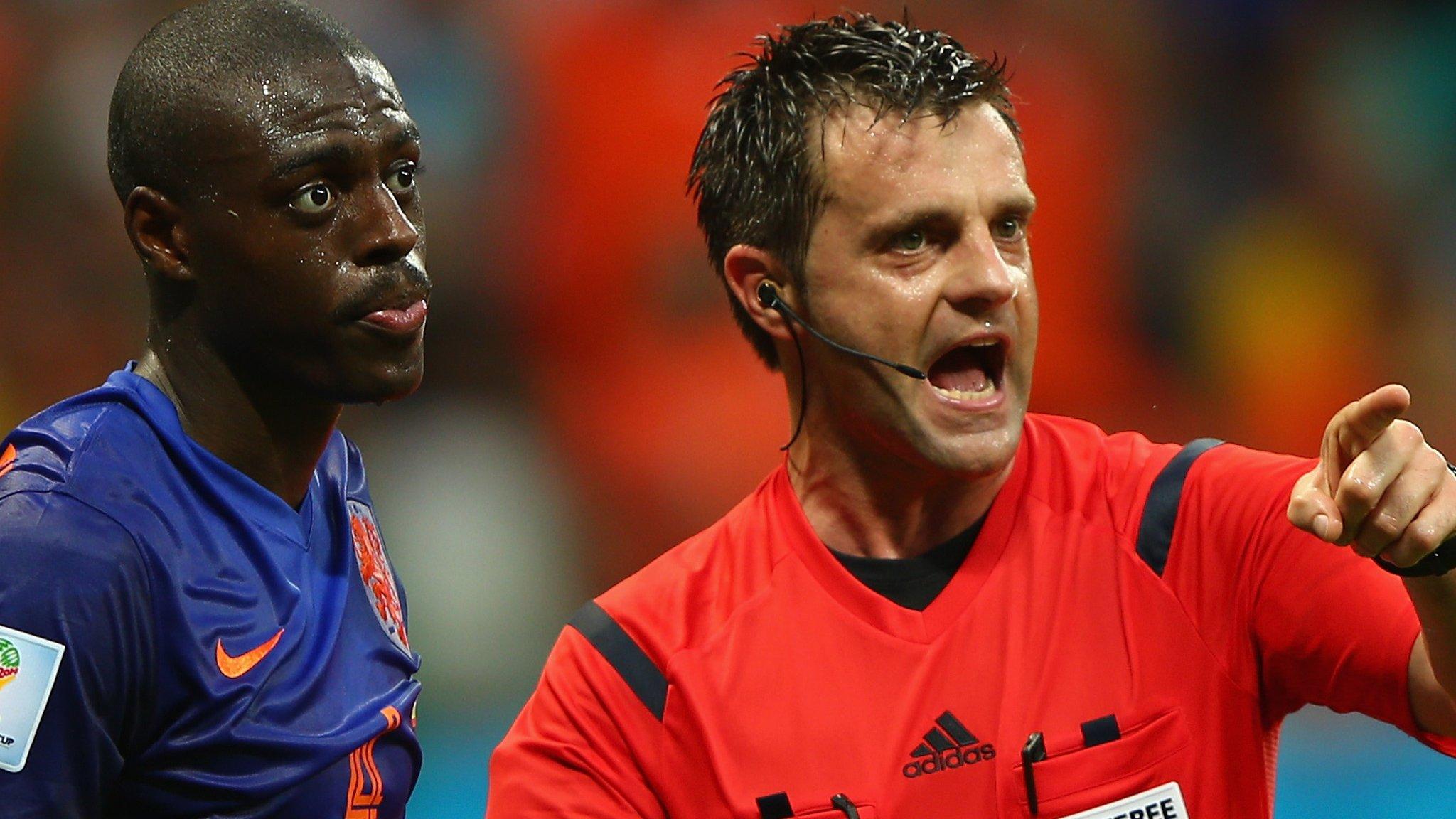World Cup 2014: Germans certain their team will beat Argentina
- Published
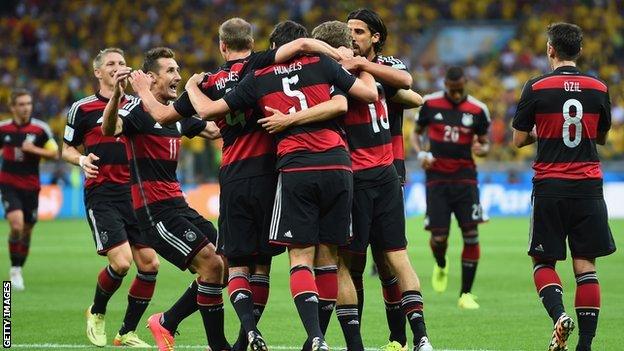
Germany's 7-1 thrashing of Brazil was one of the World Cup's biggest ever shocks
2014 Fifa World Cup final |
Venue: Maracana Stadium, Rio de Janeiro Date: Sunday, 13 July 20:00 BST |
Coverage: Live and uninterrupted on BBC One, the BBC Sport website and BBC Radio 5 live |
Life is a challenge these days in Germany if you are not a football fan.
You simply cannot avoid it. The media is awash with interest in Sunday's World Cup final, with the 'Nationalelf' (national 11) involved against old rivals Argentina.
The stunning 7-1 semi-final win over hosts Brazil resulted in football euphoria only seen before in the country when West Germany won previous World Cup tournaments in 1954, 1974 and 1990.
World Cup moments: Germany destroy Brazil
"Three days to go", "two days to go", "one day to go" - these have been the headlines from Germany's biggest selling tabloid Bild. It's the countdown to the final or the 'finaaaaale o-ho' as German fans always sing when their team reaches this biggest of big games.
"Only one more victory to glory" proclaims the twice-weekly football-magazine Kicker.
One thing is for certain: this is a nation with a yearning hunger to win the World Cup, a hunger formed in the 24 years of waiting since the last triumph, external against, who else, Argentina in 1990.
A Germany versus Argentina final also brings heavy work for all the heroes of 1990, especially Lothar Matthaus, Andreas Brehme, Rudi Voller and goalkeeper Bodo Illgner.
They are suddenly hot property again for the media, who want them to re-tell the story of how the Germans edged out Argentina thanks to an 85th-minute penalty scored by Brehme as then coach Franz Beckenbauer, who captained the nation to glory in 1974, became the first player to win as both captain and coach.
Jurgen Klinsmann, head coach of the US team and beaten by the Germans in the group stage in Brazil, posted via Facebook, holding a German shirt: "Our team will take the crown. Enjoy the moment!"
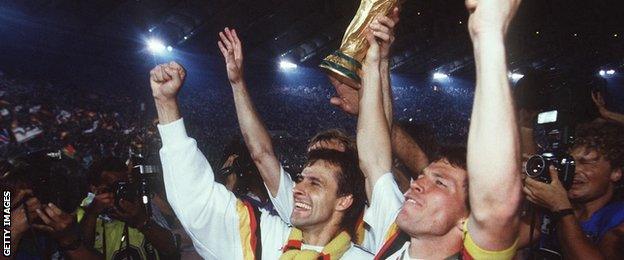
Germany avenged their World Cup final defeat by Argentina in 1986 by defeating them 1-0 in the final in Rome in 1990
All the past heroes are certain that the new generation of 2014 will make it.
Confidence in Germany is sky high, with flags draped on balconies, from windows and attached to cars. So much schwarz-rot-gold (black, red and gold) has not been seen since 2006, when Germany hosted the event and Italy beat France in a penalty shootout in the final.
That was the time when the word 'schland' was born - a nickname for the football nation and easy for fans to bawl in stadiums.
Everybody, it seems, expects Germany to win against Argentina on Sunday. Anybody who doubts it risks being called a moaner, a spoilsport. However, the near-hysteria of the media is not excessive; the media merely reflects the atmosphere of an expectant nation.
Losing against Argentina is just not an option. Not at all.
Not after this outstanding tournament. Not with Thomas Muller, Sami Khedira, Toni Kroos and goalkeeper Manuel Neuer in such great form. Not after a 7-1 routing of Brazil in their own backyard. Not after these huge reactions from fans and VIPs alike.
From Heidi Klum to Steffi Graf, from actor Til Schweiger to former F1 driver Nick Heidfeld, from basketball player Dirk Nowitzki to Boris Becker - everybody cheered the Low team on Twitter, Facebook or on TV.
Amazing Germany | |
|---|---|
There were 179 seconds between Germany's second and fourth goals during their 7-1 thumping of Brazil in the 2014 World Cup semi-final. | Striker Miroslav Klose becomes the record goalscorer in World Cup history with 16 goals in 23 games. |
Germany were 5-0 up after 29 minutes in the match - faster than any team in World Cup history. | Germany netted as many goals in this semi-final as they had in their previous six (1982-2010). |
Germany are now the highest scorers in World Cup history with 223 goals, overtaking Brazil. | They are the first team to score seven times in a World Cup semi-final. |
Thomas Muller has scored 10 goals and provided six assists in 12 World Cup matches. | They have scored more goals in this tournament than they did in 1990 and 1966 - a total of 16. |
German chancellor Angela Merkel and president Joachim Gauck are going to attend the final in Rio de Janeiro, so important is this occasion.
In Germany the feeling is they are all but champions already; the mood here is one of total confidence and belief going into Sunday's game.
It is worth pointing out that being critical about the team had almost become a type of sport in itself in Germany, such was the relatively low belief in Low and his squad going into the 2014 Fifa World Cup.
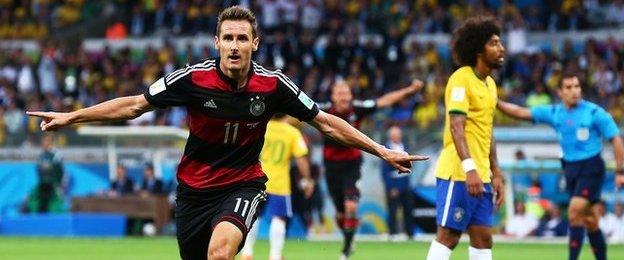
Miroslav Klose set a new record scoring his 16th World Cup goal in his fourth World Cup.
Results during the preparation period disappointed. A subdued goalless draw against Poland and a 2-2 draw against Cameroon left many observers - both media and fans - believing that Germany might risk not even qualifying for the knockout stages of this tournament. How things have changed since the beginning of June.
The stunning 4-0-victory against Portugal in the opening match was regarded as being comparable to the start in 1990, when Beckenbauer's side hammered Yugoslavia 4-1.
And so to the all-important question: can Die Nationalmannschaft (the national team) repeat the outcome of 1990?
The longing and hunger for the ultimate title in world football is enormous. After winning Euro '96, external in England (and knocking the hosts out in the semi-finals), a veil of gloom descended on the team when they were beaten 3-0 in the 1998 World Cup quarter-finals by Croatia in Lyon.
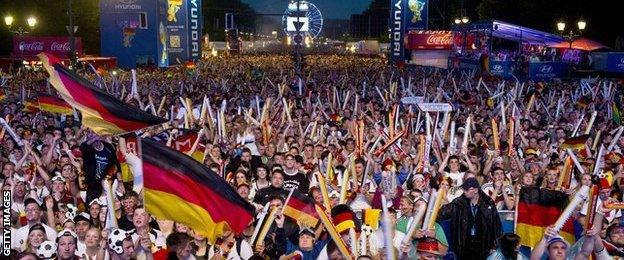
Thousands of German fans turned up at a fan park at the Brandenburg Gate in Berlin to watch their team's historic battering of Brazil
That was followed by a new low point in Euro 2000 when Germany failed to win a single match during the group stages - an outcome which resulted in the youth system being re-organised across the country.
Youth academies were set up with new rules and the promotion of more home-grown players in the Bundesliga.
After losing the 2002 final against Brazil in Yokohama, the first success for the new generation of football was the Sommermarchen (summer fairytale) of 2006 when Germany finished third on home territory, beating Portugal 3-1 in Stuttgart.
World Cup 2014: Germany 4-0 Portugal highlights
Jurgen Klinsmann and his then-assistant coach Joachim Low created a new style, an optimistic, more attacking way of playing as the Germans reinvented themselves on the international stage.
They were runners-up to Spain at Euro 2008, gained another third place at the 2010 World Cup in South Africa and featured in the semi-finals of Euro 2012. Now, the uncrowned Golden Generation is at its peak and ready to go one step further.
Miroslav Klose, now the highest World Cup finals goalscorer of all time, Per Mertesacker, Lukas Podolski and the captains Bastian Schweinsteiger and Philipp Lahm were already part of the team in 2006 and all are now mature enough to expect victory.
According to all the experts in Germany, it seems Argentina should be an "easier" team to beat than losing semi-finalists Netherlands would have been.
The Germans are confident that any Brazilian supporters in Rio will cheer for them despite their humiliation in the semis. Surely the locals will not support arch-rivals Argentina on the hallowed turf of the Maracana.
Germany's near misses | |
|---|---|
2006 World Cup | Germany defeated Argentina in the quarter-final 4-2 on a penalties, after the match ended 1-1. In the semi-final they lost 2-0 against Italy in extra time. |
2008 European Championships | Germany defeated Turkey 3-2 in the semi-final but lost to Spain 1-0 in the final. |
2010 World Cup | Germany defeated Argentina 4-0 in the quarter-final but lost 1-0 to Spain in the semi-final. |
2012 European Championships | Germany defeated Greece 4-2 in the quarter-final, but lost to Italy 2-1 in the semi-final. |
Low has pointed out the significance of this final and has tightened up how his squad are approaching the game.
There have been no more open training sessions for the media, no one-to-one interviews, just press-conferences. Wives, girlfriends of the players or family members are allowed into the self-built exclusive base camp of Campo Bahia. But a glass of beer or wine is forbidden.
Germany are planning (and hoping to have) a big party in Rio on Sunday night at which all the relatives and friends will be welcome. And the German football federation will present the full squad at the Brandenburger Tor in Berlin on Tuesday - but only if they are winners. National heroes.
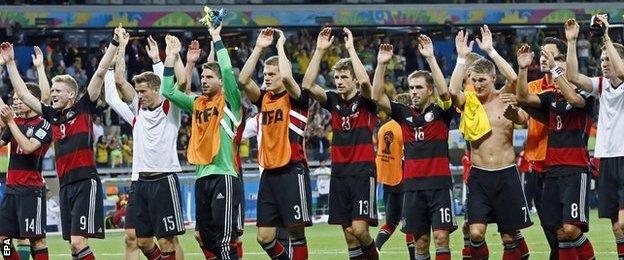
The German team have a great togetherness, with seven first team members playing for Bayern Munich
This third meeting in a final of the two rivals will be different from the previous encounters. There will be no Diego Maradona against Matthaus. It will be Lionel Messi against a team rather than a single German star.
"The atmosphere in the squad has been enormous," Low said. "Even the players on the bench and the ones who did not play a single minute were enthusiastic and got the others water."
The last encounter between Germany and Argentina in a World Cup was the quarter-final in 2010. Germany dominated Argentina, featuring a below-par Messi, coached by Maradona, and won 4-0., external Muller scored, Klose twice.
Will there be a new edition for Schland?
For the best of BBC Sport's in-depth content and analysis, go to our features and video page.
- Published12 July 2014
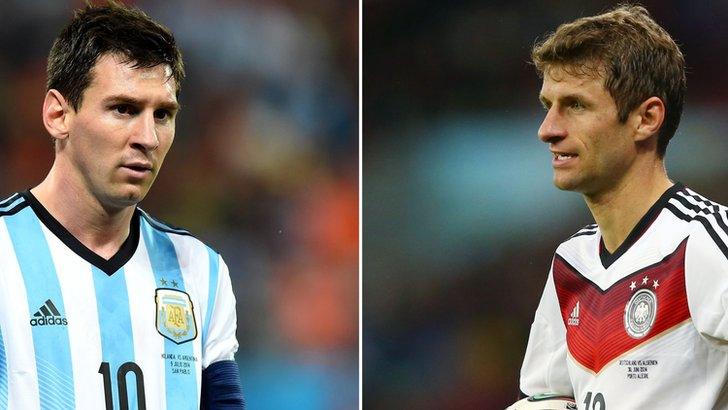
- Published13 July 2014
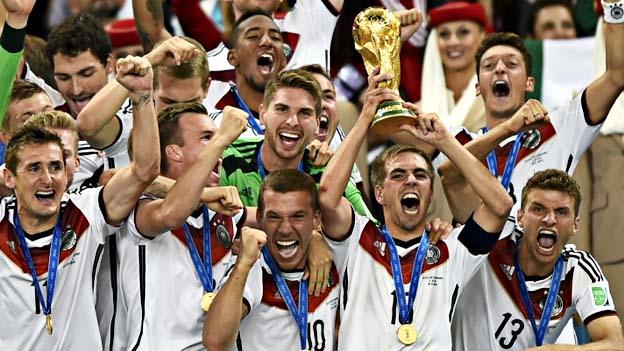
- Published12 July 2014
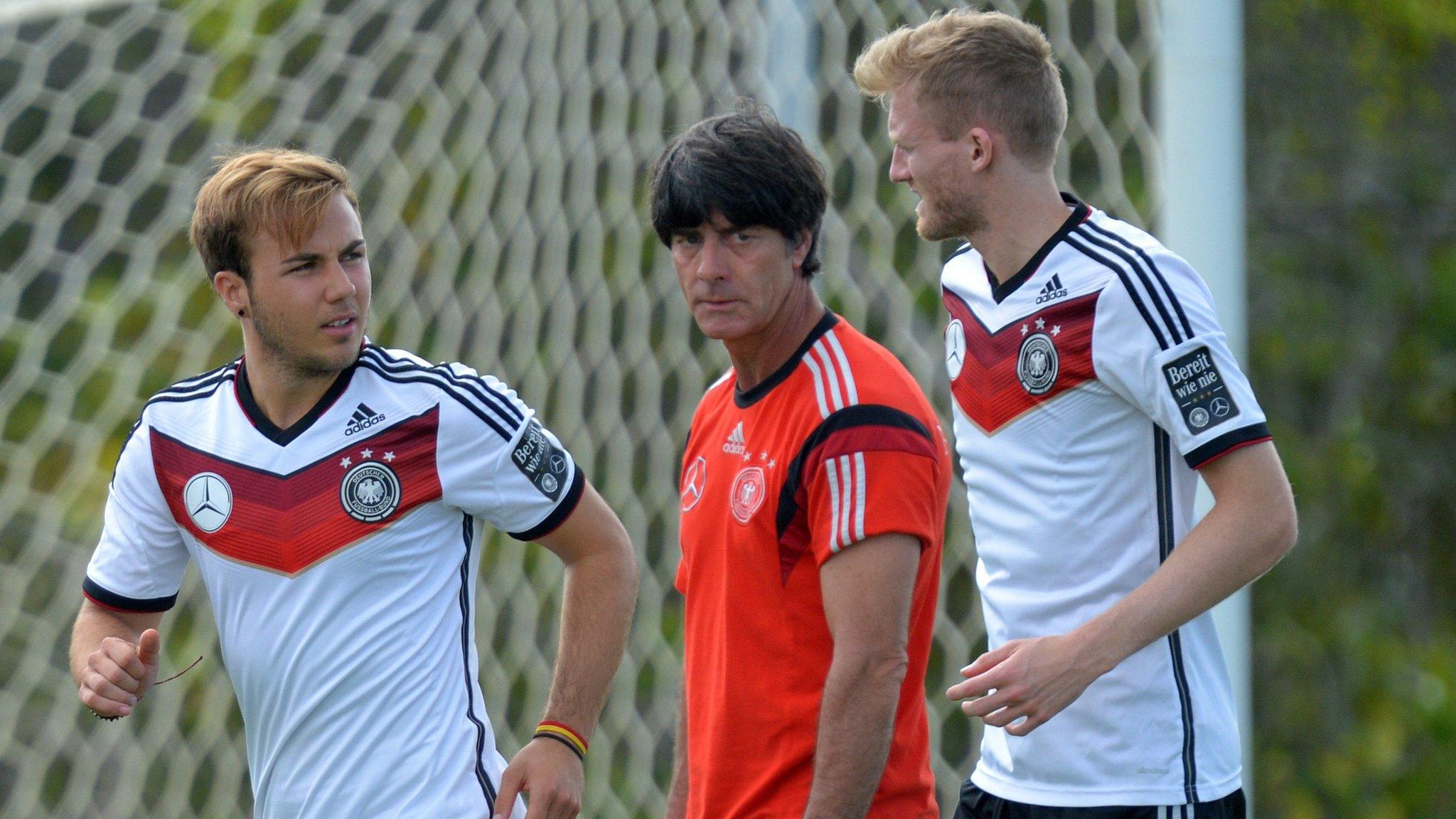
- Published11 July 2014
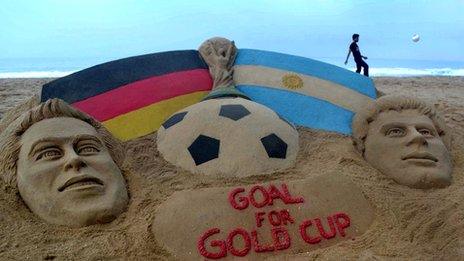
- Published12 July 2014
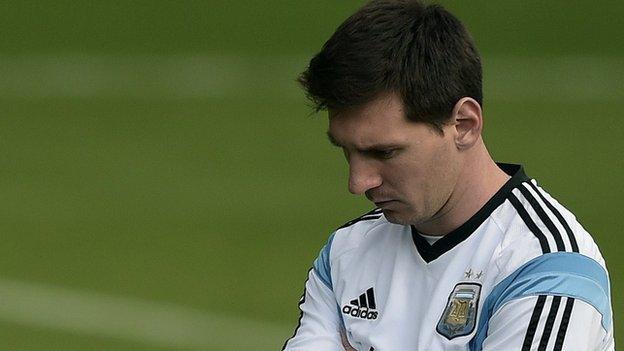
- Published12 July 2014
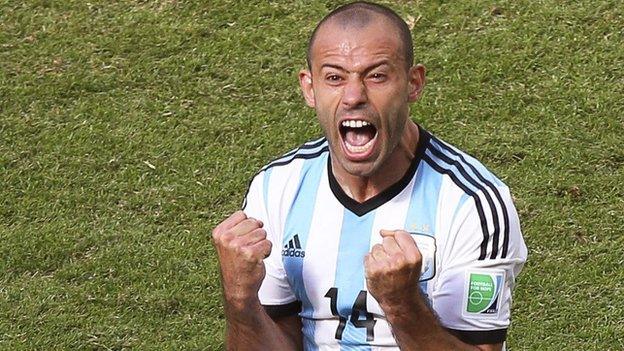
- Published11 July 2014
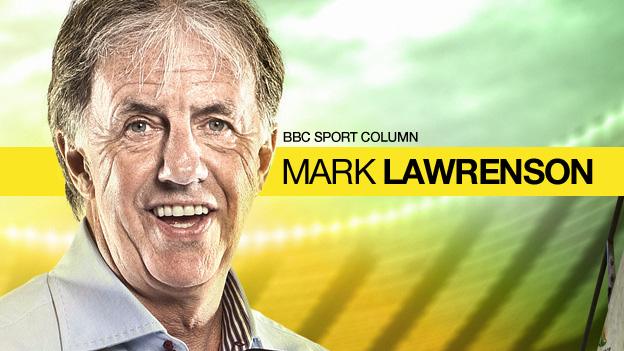
- Published11 July 2014
